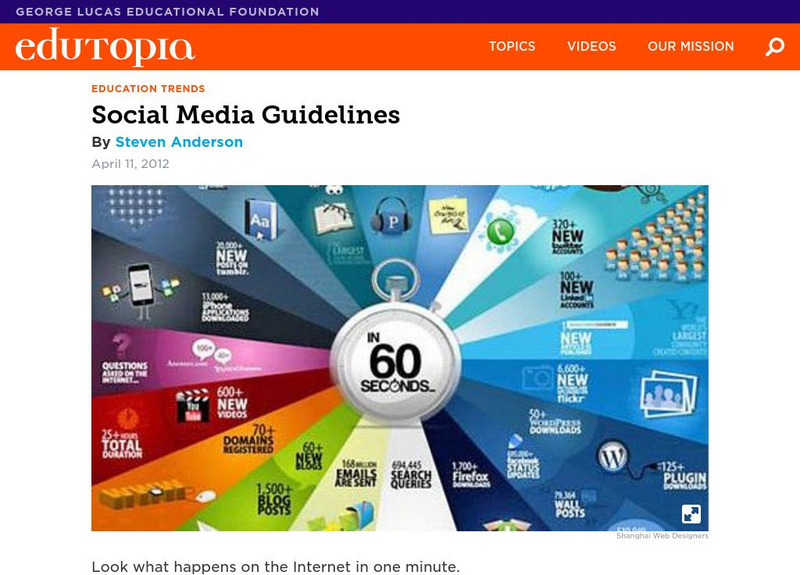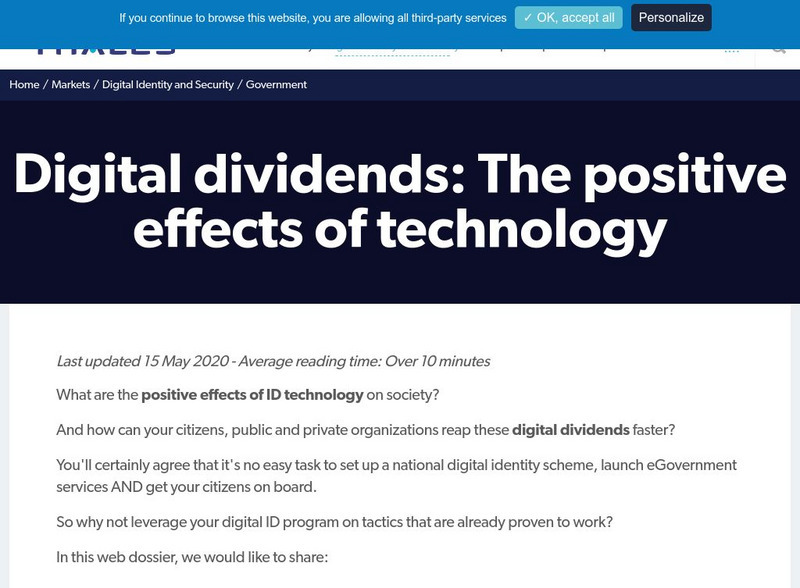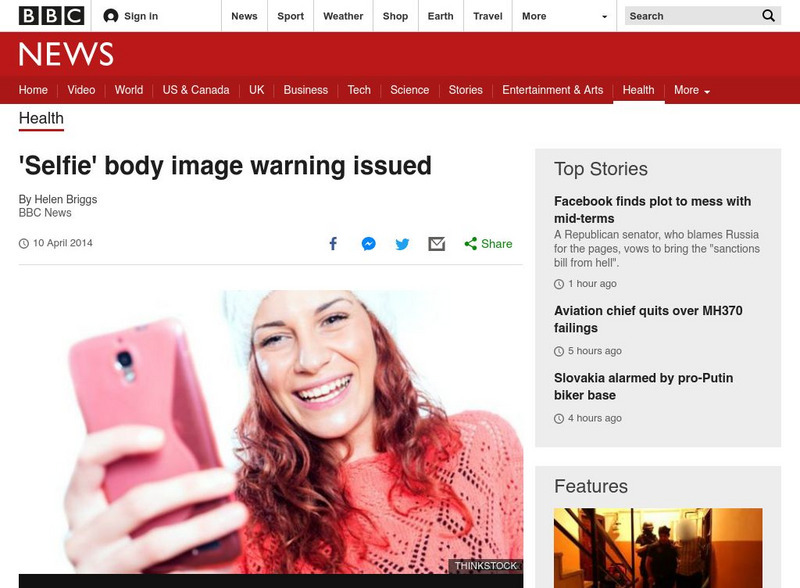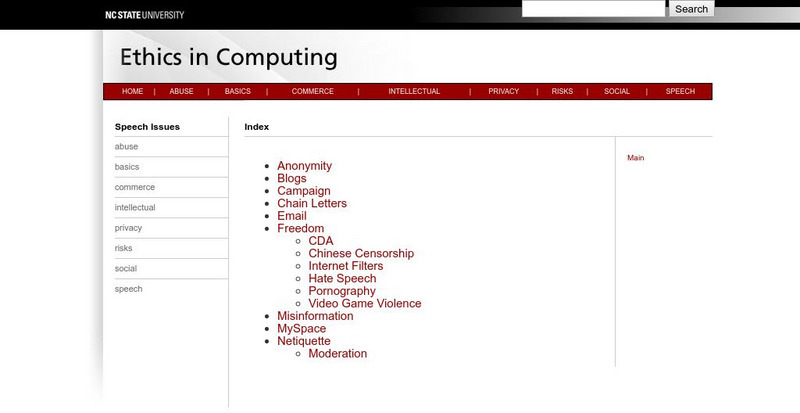Hi, what do you want to do?
PBS
Pbs Kids: Get Your Web License
Take a virtual tour around the Internet. Each stop has a quiz question. Earn the Web License by completing the quiz.
Common Sense Media
Common Sense Media: Education: Who's Looking at Your Digital Footprint?
Our digital footprints can have a powerful impact on our future. This can be a scary thought, given that what's in our digital footprint isn't always in our control. Teach students that digital footprints are an opportunity to showcase...
REMC Association of Michigan
Remc Association of Michigan: 21 Things4 Students: 6. Cyber Safety
This learning module is made up of nine quests organized into sets of three. In the first set, students learn how to protect themselves online. In the second, they go through three simulations/games to learn how to protect their...
Edutopia
Edutopia: Social Media Guidelines
Read about the ways in which educators can create social media guidelines that work to keep students safe.
Other
Connect Safely: Connect Safely: Smart Socializing Starts Here
This resource offers students and adults information in order to help young people socialize safely online.
Other
Kings Canyon Unified School District: Internet Safety [Pdf]
Young scholars will identify and learn to avoid situations that could threaten our safety when using the Internet.
Other
Safe Surfing Kids: Safe Internet Surfing Quiz
Take this quiz and find out if you're a certifiable "Safe Surfing Kid" or you need to study up before becoming a savvy Internet user.
Ducksters
Ducksters: Kids Safety: Using the Internet
On this website, students can explore how to use the internet safely. This site has students learning web safety with tips from the FBI.
Other
Kids' Turn Central: Netiquette: Minding Your P's and Q's Online in Chat Rooms
An article with general tips on how to behave when participating in online chat rooms.
Other
Thales Group: Digital Dividends: The Positive Effects of Id Technology
This article provides a pro-business perspective on the adoption of digital identification of citizens by governments around the world. It looks at how governments can better serve their citizens by using this technology, its economic...
ABCya
Ab Cya: Cyber Five
Cyber-Five is a short animation which introduces children to five helpful rules to be safer on the internet. Join Hippo and Hedgehog as they introduce and review the five rules. There is a multiple choice quiz at the end of the animation...
Science Education Resource Center at Carleton College
Serc: The Digital Divide: A Data Analysis Activity Using Subtotals
A lesson plan that includes a PowerPoint learning module for students. The purpose of the lesson is to teach how to use Excel to analyze a large amount of data, in this case from the US Census. The example being used is the accessibility...
Media Smarts
Media Smarts: Your Connected Life: A Teen's Guide to Life Online [Pdf]
This guide is designed to help students who are just entering high school balance the demands their offline life with their digital one. The guide offers practical advice on a variety of activities kids like to do online, including...
Council for Economic Education
Econ Ed Link: Cybersecurity and Economics: Protecting Your Identity Online
Help students answe the esential question, "What should you do before you share information on the Internet?"
Common Sense Media
Common Sense Media: Cyber Smart! Student Curriculum Lesson: Can You Hack It? [Pdf]
Students learn that computers and electronic files are property and explore the reasons for, consequences, and ethics of teen hacking. This ISTE-aligned lesson plan for Grades 6-8 includes student activity and Home Connection sheets....
Other
Cyber Smart!: Whose Is It, Anyway? [Pdf]
A worksheet to accompany a lesson where students learn that, although the Internet makes it very easy, copying others' work and presenting it as one's own is unethical, unfair, and unacceptable.
Other
Common Sense Media: Strong Passwords [Pdf]
In this lesson, students learn how to create secure passwords in order to protect their private information and accounts online.
Other
Common Sense Media: The Power of Words [Pdf]
Students consider that while they are enjoying their favorite websites they may encounter messages from other kids that can make them feel angry, hurt, sad, or fearful. They explore ways to handle cyberbullying and how to respond in the...
Other
Common Sense Media: Private and Personal Information [Pdf]
In this activity students learn the difference between private information and personal information, distinguishing what is safe and unsafe to share online.
Other
Common Sense Media: Talking Safely Online [Pdf]
In this lesson students learn that they can develop rewarding online relationships, but that they should never reveal private information to a person they know only online without asking their parent or guardian for permission.
BBC
Bbc: Week of 7 21 14: French Blogger Fined Over Review's Google Search Placing
Learn about the lawsuit against a blogger and why both Google and the judge in the case have found fault with the blogger's actions.
BBC
Bbc News: Selfie Body Image Warning Issued
Could too much involvement in social media cause body image issues. Read about what current research says on the subject.
NC State University
North Carolina State University: Ethics in Computing: Speech Issues
Curated collection of links to articles, essays, and related topics on responsible use of the Internet and information technologies with respect to speech and online hate compiled and maintained by a university instructor.
Other
Digizen: Cyberbullying: Let's Fight It Together
Video tells the story of a young teenager who is subjected to cyberbullying-repeated hostile, harmful, and harassing attacks directed at individuals though technological means (Internet, mobile phones, social networking sites)....

















